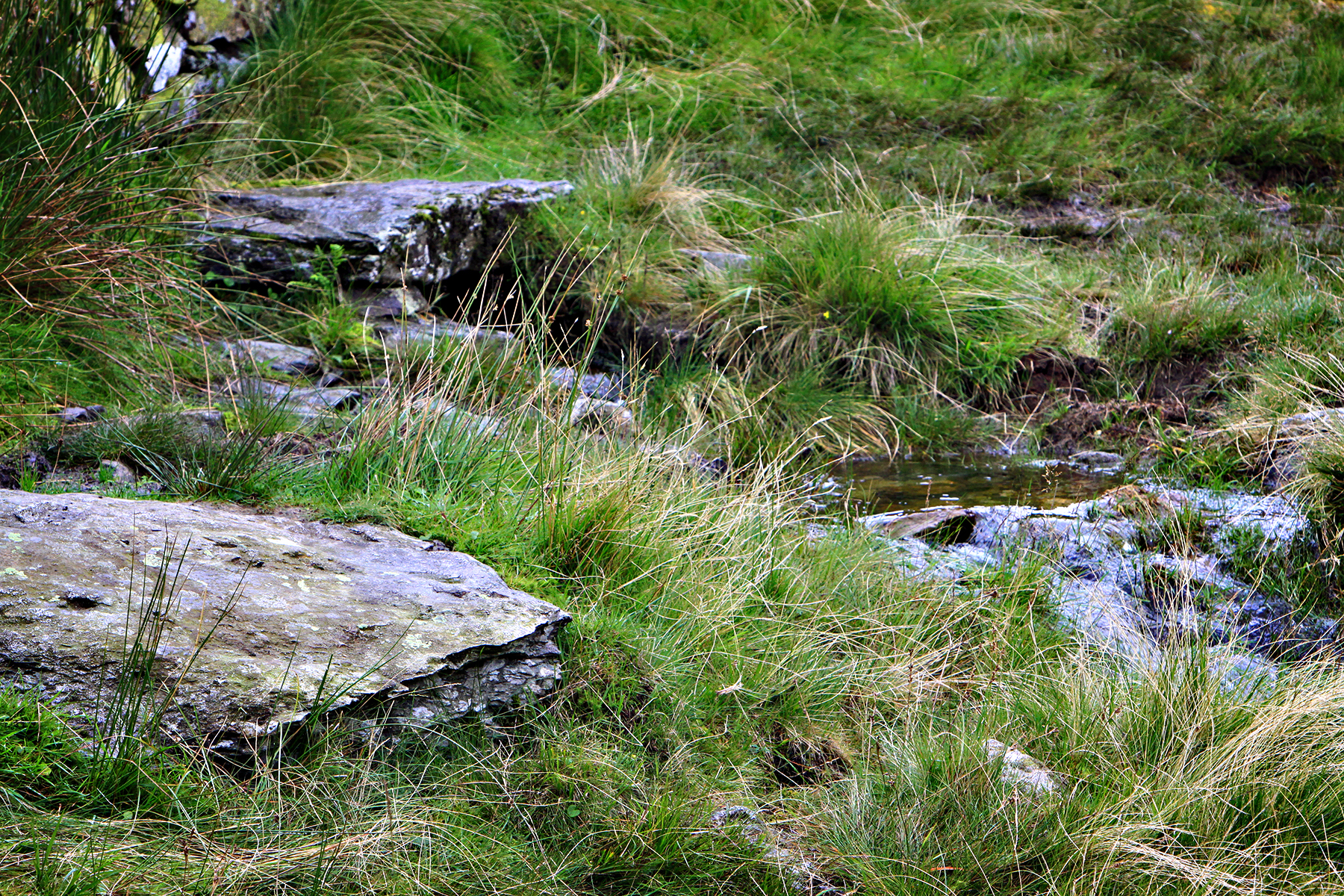Sweat trickled into my eyes as I trudged up the hill, one arm raised to balance the concrete block digging painfully into my shoulder. The thump of shovels greeted my arrival to the cistern-building project where local workers already labored knee-deep in a hole. I was in Haiti with a team hosting a day camp for children from the village, and the day’s activities had just ended when the opportunity arose to assist with hauling building materials to the construction site.
Clean water is a thing I so often take for granted even as it is a necessity that many parts of the world still lack, so I eagerly pitched in along with the rest of my team to help by carrying blocks.
We could not know then that those building materials were subpar, or that an incorrect ratio of sand to cement in the concrete blocks would lead to the cistern’s collapse within weeks of its completion and months of our departure. I vividly remember the photo we received of the aftermath: plants crushed by the weight of the water, ground eaten by the flood, broken concrete blocks and twisted rebar left scattered.
Thankfully, no one was injured. But in a matter of moments, weeks of work were reduced to nothing. The cistern proved incapable of storing water and its failure left rubble to clear before rebuilding could begin.
That photograph instantly came to mind when I read this verse today: “My people have committed two sins: They have forsaken me, the spring of living water, and have dug their own cisterns, broken cisterns that cannot hold water.” (Jeremiah 2:13 NIV)
These words were directed at the people of Israel who were struggling through yet another period of idolatry and unfaithfulness to the Lord. God had led them into a land of their own, invited them to flourish, provided the resources needed for growth and abundance, and yet consistently, rather than abiding in Him, they set their affections and hopes upon other fleeting, futile things.
Instead of drinking life-giving water directly from the source, they labored, sweated, and bled under the hot sun, digging cisterns of their own only to watch their efforts prove worthless as the object of their desire drained through the imperfections in their work.
Only to be left exhausted, disheartened, and thirsty. Still, so thirsty.
The storyteller in me latches onto the imagery here and longs to root out why. Motivation is a currency we storytellers trade in, and questions are the tools we use to mine it. Why dig when they could simply drink? Why build a reservoir when they already had access to an endless spring? Even the Samaritan woman who met with Jesus by the well understood that if she could drink of the living water and let it eternally slake her thirst, she would no longer need to return to the well to draw. (John 4)
Could it be that having tasted of such a spring, still they doubted that it was enough?
Like Adam and Eve who were surrounded by the natural riches of Eden and enjoyed daily walks with God in the coolness of the evening yet still longed for the one fruit placed beyond their reach, convinced that this abundance of provision was somehow lacking.
Chasing after the Wind
It can seem foolish to me, standing seemingly removed from such a situation by thousands of years, and yet, if I am honest in my self-reflection, I detect this tendency far too often in myself. Creative workers can be uniquely susceptible to the temptation to fashion cisterns out of our endeavors and idols out of the works of our hands, and in them to seek fulfillment, hope, validation, success, worth, and meaning for life itself. At the root of too many of my efforts lies a longing to build “enough” for myself only to find “enough” elusive.
In such a state, the words of the Teacher in Ecclesiastes resonate with my frustration, though he uses a different and yet equally vivid metaphor to reveal the futility of such work.
“I denied myself nothing my eyes desired; I refused my heart no pleasure. My heart took delight in all my work, and this was the reward for all my labor. Yet when I surveyed all that my hands had done and what I had toiled to achieve, everything was meaningless, a chasing after the wind; nothing was gained under the sun.” (Ecclesiastes 2:10-11 NIV)
Work becomes meaningless when we seek to gain from it something it was not meant to give. Success becomes vain when we make of it an idol.
In seeking fulfillment, worth, and meaning anywhere outside of God, we strive to grasp the wind. Our legacies will be forgotten. Our works will be lost to the course of time. And though we take up our shovels and start digging, no matter how deep or wide we hew our cisterns, still the walls collapse, the blocks crumble, the waters pour out, and still, we thirst.
Spring of Living Water
Only last weekend, exhausted after a day of creative striving in which I too often yielded to the temptation to place my hope and my value in my work, I stepped outside to wait for the sunset. It was slow in coming, or perhaps I was only impatient, struggling to sit and be still while the need to strive still pulsed through my veins.
But sit, I did, and as the clouds began to darken, I whispered a prayer,
“Lord, show me your goodness.”
Because no matter how often I resort to striving to prove or earn or hold onto my worth, I know that this is my hope: the Lord is good and has promised good to me and His good is abundantly more than enough.
Then I sat, impatient jitters gone, as He answered my weary, aching, desperate soul with a whisper of rain from a sunshower that deepened every color and made every blade of grass seem somehow more real, more true, in the light of the vibrant, full arc, double rainbow that stretched across the sky.
The psalmist invites us to taste and see that the Lord is good (Psalm 34:8), reminds us to wait upon Him and trust that we will see His goodness (Psalm 27:13-14), and encourages us to meditate on His Word and become like a tree planted by streams of water (Psalm 1:2-3). All of our longings for fulfillment, meaning, and hope are answered in the unimaginable truth that we have been valued at the priceless life of God’s own beloved Son.
And whatever creative work we seek to do—imperfect and incomplete as it may be—it can become good and beautiful in truth if it draws upon that living spring and like an aqueduct disperses the overflow to others.
Grace abundant flows from that stream, grace that will transform every aspect of our lives and forever slake our thirst. If we will just pry loose our blistered hands, abandon our shovels beside our broken cisterns, and kneel at the spring to drink our fill.
The featured image is titled “Resting Place” and was made in the Lake District in England.
It is © Lancia E. Smith and used with glad permission here for The Cultivating Project.
Gillian Bronte Adams is a writer, wanderer, and wordsmith who is rarely found without a coffee in hand and rumored to pack books before clothes when she hits the road. Working in full-time youth ministry left her with a passion for journeying alongside teens as they follow after Christ. Combined with her lifelong love of story, that passion drew her to pursue the art of writing young adult fantasy novels, like The Songkeeper Chronicles, that ring with the echoes of eternity. Her favorite stories feature outcast characters traveling down broken roads, through epic battles, and onward toward adventure. At the end of a long day of typing, she can be found saddling her wild thing and riding off into the sunset, provided she has not already settled down a mug of coffee and a very long book.
Leave a Reply
A Field Guide to Cultivating ~ Essentials to Cultivating a Whole Life, Rooted in Christ, and Flourishing in Fellowship
Enjoy our gift to you as our Welcome to Cultivating! Discover the purpose of The Cultivating Project, and how you might find a "What, you too?" experience here with this fellowship of makers!


Sweet handmaiden of the Lord, His words through your surrendered pen breathed through the heat of my worry fevered soul this morning. Thank you.
I will go now to drink further, at the Source.
May you continue to be blessed today as you have blessed.
Wonderfully expressed reminder that our lives must be based all In Christ–his guidance, power, and Beauty. Thank you.
‘because no matter how often I resort to striving to prove or earn or hold onto my worth, I know that this is my hope: the Lord is good and has promised good to me and His good is abundantly more than enough.’
Thank you for this beautiful reminder.